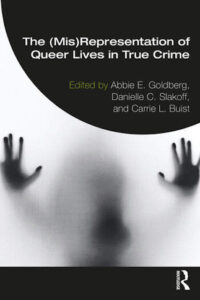Challenge. Change. Podcast
The story of queer lives in true crime
Turn on the TV or open a podcast app and you’re likely to find true crime. Americans have a morbid fascination with these stories — The Pew Research Center reports that true crime is the most common topic of top-ranked podcasts in the U.S. As a trio of scholars consumed this content, they noticed a pattern: Stories about LGBTQ+ people, as perpetrators or victims of crime, were told less frequently and in a different tone than that of their cisgender and heteronormative peers.
“The (Mis)Representation of Queer Lives in True Crime” is a new book co-edited by Abbie Goldberg, professor of psychology at Clark; Danielle Slakoff, professor of criminal justice at California State University, Sacramento; and Carrie Buist, professor of criminology, criminal justice, and legal studies at Grand Valley State University in Michigan. The volume analyzes the intersection of LGBTQ+ people and crime, including the treatment of queer people in the criminal legal system, how the mass media delivers such stories, and which details are emphasized or erased in the dominant narrative.
 “Although queer and trans people are disproportionately affected by crime, the majority of true crime podcasts, documentaries, and so on focus more on cisgender, heterosexual folks — often young, white folks,” Goldberg says. “A lot of media content creators are heterosexual and so they’re often creating content that matches their own identities.”
“Although queer and trans people are disproportionately affected by crime, the majority of true crime podcasts, documentaries, and so on focus more on cisgender, heterosexual folks — often young, white folks,” Goldberg says. “A lot of media content creators are heterosexual and so they’re often creating content that matches their own identities.”
Slakoff says the media’s depiction of queer people, especially trans women, often paints a picture of hypersexual, deceptive people. “If that is what’s portrayed in the media, that is what people begin to believe — or they internalize those ideas,” she adds.
It’s one factor that makes the queer community less likely to report a crime, according to Buist.
“LGBT folks are often blamed for not only their own victimization,” Buist says, “but for their existence.”
Challenge. Change. is produced by Andrew Hart and Melissa Hanson for Clark University. Listen and subscribe on Spotify or Apple Podcasts. Find other episodes wherever you listen to podcasts.



